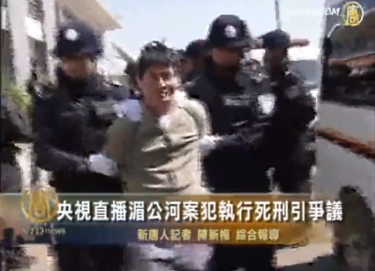The unprecedented decision of China's state-run television network to broadcast live the final moments of a Burmese drug lord just before his execution has not only sparked outrage in Myanmar but has also triggered debate on the mainland over whether the move was an act of justice or vengeance.
Naw Kham, the leader of a Burmese drug smuggling ring, and three of his accomplices, who massacred 13 Chinese crewmen on the Mekong River in 2011, were executed on March 1, 2013. The TV network chronicled the lead-up to the executions in a two-hour special that shows the convicts being escorted from the prison cells to the lethal injection room.
This isn't first time a Chinese television network has tapped into the run-up to a state execution. A controversial but wildly popular program called “Interviews Before Execution” ran from 2006 to 2012 in central Henan Province, in which a reporter interviewed murderers condemned to death shortly before the sentence was carried out.
Defending its decision, CCTV asserted that “execution isn't the same as watching people be killed”. Similar to previous shows, the criminals were taken off-camera and away from the public's eyes in the final executions.
The live broadcast instantly became a hot topic online. According to an online poll [zh] launched by a local journalist of users on the popular Chinese microblogging site Sina Weibo, only 11.56 percent supported the live broadcast of execution, while 85.55 percent saw it as a violation of basic ethics. For those who supported the live broadcast, they applauded the death sentences as just retribution.
China leads the world in its use of capital punishment, though the exact number of executions has always remained a state secret. The Chinese legal system's incompetence and the low bar set for which crimes are punishable by death drive the regime's frequent executions, according to a review by The Atlantic magazine.
But the country has made overtures to improve the situation. In 2010, the Supreme People's Court called for judges to reserve the ultimate punishment for only serious crimes.
Long time ahead (來日方長__VR) [zh], a Baptist university student, wrote that she didn't have any problem with the broadcast:
央视直播糯康死刑是合理的,告诉大众残忍的夺取别人性命是可恨的,一定会受到应有的惩罚。央视并没有直播注射糯康过程是人道的。让民众看到一个生命消失的过程并不是法制社会所想传达的,那与古代砍下首级示众有何分别。我认为央视没有做错。
@來日方長__VR: CCTV's live broadcast is reasonable, which speaks to the fact that those who claimed others’ lives will get their due punishment. It's morally right for CCTV not to broadcast the lethal injection, because it then makes no difference between a legal society and the brutal old society. In a legal society, people should not allowed to see the disappearance of lives. I don't see anything wrong here.
But a majority of people disagreed that it was appropriate for a state-run television to broadcast the execution parade. Many lawyers decried that the TV program violated the law, while public opinion leaders complained the execution was immoral.
Attorney Si Wei Jiang (@斯伟江) [zh] was one among them:
央视直播执行死刑(?),是扩大版的执行死刑示众。最高法院司法解释明文规定:执行死刑应当公布,不应示众。从道德上来说,也是非常残酷的。
@斯伟江: CCTV's live execution is just expanding the range in which the execution is being publicly exposed. The judicial interpretations of the Supreme Court dictates that executions “should be announced, but should not be publicly exposed”. It is also crass in the moral realm.
Han Yaoyi (@刑法韩友谊) [zh] pointed out that live execution is not an embodiment of the legal spirit:
糯康该当死刑,即使面对国际反死刑公约也毫无疑问。但直播死刑执行(电视网络游街)不是法律精神的体现,是权力在肉体上的展示,寻求的是暴力的看客。我们应该清楚:仅是目的不同。从手法上讲,国家暴力并不比罪犯的暴力更高尚。
@刑法韩友谊: Naw Kham should be executed no doubt, even being protected from the international convention that is against the death penalty. But CCTV’s live broadcast of the execution is a live parade on TV and the Internet, this is not showing justice, this is showing power over flesh, and this is looking for the bystanders of the violence. We should realize that the state violence is no better than criminal violence and the difference only lies in their purposes.
Writer Zhao Chu (@赵楚) [zh] took a more humanist perspective on the issue:
罪犯依法判处死刑,只是用生命偿还罪责,刑罚问题,何必以这种方式展览残暴?罪犯也有人格,也是人,有人的基本尊严,这种尊严也是所有人的尊严,生命的尊严。
@赵楚: The criminal pays for his crime with his life. It is just a criminal punishment, which is not necessary to be exposed to the public in such a brutal way. Criminals also have their own dignity, the basic dignity that every human being should enjoy.
The other side of Netease (@网易另一面) [zh] seemed get to the heart of the problem:
抓捕并处置糯康犯罪集团,本是彰显中国有效执法的案例,但央视高调的“直播”却起到适得其反的效果。与萨达姆被绞死视频外泄不同,国家电视台的名义“直播”,表面上看是慰藉同胞的道德剧,实质则是炫耀暴力与展示权力的国家宣传片。
@网易另一面: Naw Kham and his henchman being captured and punished should have been viewed as a case study of the effective law enforcement in China. But CCTV's high-profile live broadcast led to the exact opposite effect. The live execution aired by a state-run television is different from the video of Saddam Hussein's execution, which was leaked out accidentally. At first glance, CCTV's live execution serves as the morality play that comforts Chinese, but actually it rolls out as a promotion program that showcases the nation's violence and power.








2 comments